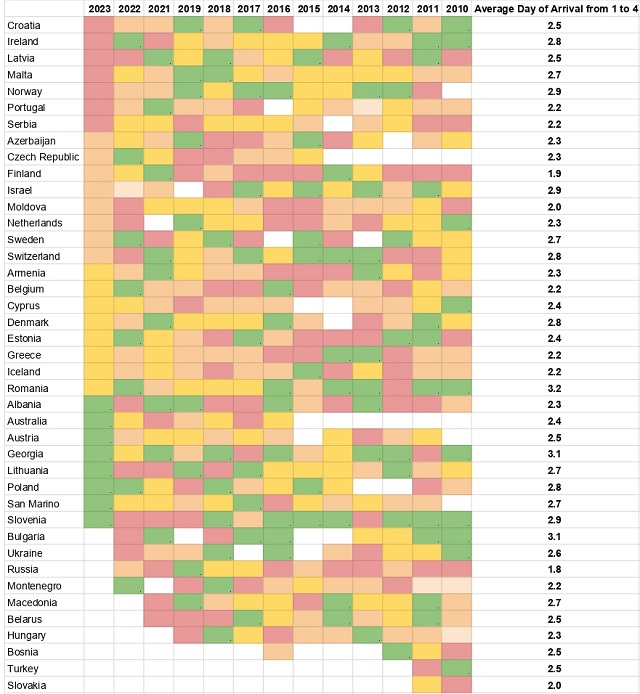One can attempt to measure the success of the Semi Final Allocation Draw by looking at if an earlier or later draw is an advantage or not, as we’ve already done this week.
There is, though, a different measure we can use in assessing how successful a delegation has been at the Allocation Draw, and that is not a factor based on your qualification percentage. Instead, this is about money, and the premise of why the Allocation Draw sits in this place in late January.
In A Rich Man’s World
The reason for holding an Allocation Draw now, rather than later in the season once songs are known, is to help delegations plan before the competition. It is a convention that the songs that are part of the first Semi-Final will rehearse before the songs in the second Semi-Final; on average, songs that are drawn into the first half of the first Semi-Final will rehearse three days before songs drawn at the end of the second Semi-Final.
This gives an advantage to broadcasters that draw into the second Semi Final, especially the second half of that show. This means that they can arrive in the host city a few days later than some of the other nations, and save on accommodation costs.
The amount of money is not insignificant. Some nations publish detailed information about the costs of their Eurovision participation each year. One of those is Ireland. We know that the Irish participation in Eurovision 2023 in Liverpool, where they performed in the first half of the first Semi Final, had accommodation fees that came to €52,314, 17 percent of the total costs of the Irish delegation. Making some rough assumptions that the Irish delegation booked to be in Liverpool for 14 days, and that accommodation costs in Eurovision week itself are double that of the week before, we end up with a rough per night figure of €2,491 for one night of accommodation at Eurovision for this delegation.
The end result of this is that the Irish delegation could reasonably have been expected to save around €7,500 extra if they were to draw one of the later slots.
Budget issues are on the agenda at Eurovision. Romanian broadcaster TVR has decided not to participate at Eurovision 2024 for budgetary reasons, as the participation fees for all broadcasters are set to increase once more. Romania, with a shorter stay in Liverpool last year, spent just €23,500 on accommodation costs in Liverpool. Being able to save costs for them by choosing a cheaper accommodation option and being in Liverpool for a shorter time was a benefit. This is actually a benefit that Romania has benefitted from more than any other nation. Not only has Romania appeared in 10 out of 13 second Semi Finals, but six of those ten times have they drawn a second half appearance and an extra day or two at home.
The following table shows how different countries have appeared in which quarter of the Allocation Draw, and with that, how early they have had to arrive at Eurovision (some delegations have negotiated their times with other delegations or the EBU at a later date, those are not included here)

Table showing how early Semi Finalists have needed to arrive in the host city dependant on the Allocation Draw. Red means day 1, orange day 2, yellow day 3 and green day 4.
While Romania can claim to be the most cost-effective nation at Eurovision thanks to the Allocation Draw, Russia and Finland can bicker about who has been most unlucky. Finland holds a staggering statistic of drawing the first half of the first Semi Final on 7 of the last 13 occasions. The luck of the draw isn’t just about your chance of qualifying, it’s about the extra cost you need to spend to be there.
A few thousand Euros may not be a groundbreaking amount compared to the cost of competing in Eurovision but in times of financial pressure on certain broadcasters that have already forced out some Eurovision regulars, every little helps.
You may cheer watching the Allocation Draw if you get a second half slot, or if the countries that normally vote for you draw the same show, or if you end up in the smaller show.
You may also cheer if, thanks to the Allocation Draw, you arrive a couple of days later than the others. That’s a few thousand Euros saved for your broadcaster thanks to a lottery.










Good analysis!